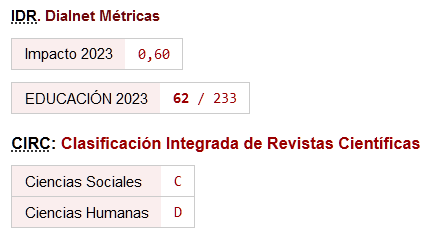Mindfulness en futbolistas masculinos: un estudio transversal
DOI:
https://doi.org/10.46661/ijeri.5398Palabras clave:
Mindfulness, Futbolistas masculinos, Estudio transversalResumen
El presente estudio tiene como objetivo determinar si la atención plena muestra una diferencia significativa en función del estado amateur / profesional de los jugadores de fútbol masculino, la posición, la experiencia de juego, el historial de recibir tutoría, asesoramiento o terapia de rendimiento psicológico de un psicólogo deportivo y el estado de realización de entrenamiento mental. El estudio se realizó con 233 jugadores de fútbol varones adultos y se aplicó a los participantes el Inventario de Mindfulness para el Deporte y el Formulario de Información Personal. Como resultado del estudio, se encontró que los jugadores de fútbol profesionales tenían niveles más altos de atención en comparación con los jugadores de fútbol aficionados. Se observó que los niveles de mindfulness difirieron a favor de los futbolistas que recibieron tutoría o asesoramiento psicológico de desempeño, realizaron entrenamiento mental y tenían más experiencia en deportes. También se observó que los atacantes tenían mayores niveles de atención en comparación con los mediocampistas.
Descargas
Citas
Aydoğan, H. (2016). Examining Self-Esteem of Professional Football Players in terms of some Variables Journal of Sport Culture and Science, 4(Special Issue 1), 278-290.
Bulğay, C., Tingaz, E. O., Bayraktar, I., & Çetin, E. (2020). Athletic performance and mindfulness in track and field athletes. Current Psychology, 1-8. https://doi.org/10.1007/s12144-020-00967-y
Bühlmayer, L., Birrer, D., Röthlin, P., Faude, O., & Donath, L. (2017). Effects of mindfulness practice on performance-relevant parameters and performance outcomes in sports: A meta-analytical review. Sports Medicine, 47(11), 2309-2321. https://doi.org/10.1007/s40279-017-0752-9
Cohen, J. (1988). Statistical Power Analysis for the Behavioral Sciences (2. Edition). NJ: Erbbaum.
Deyo, M., Wilson, K. A., Ong, J., & Koopman, C. (2009). Mindfulness and rumination: Does mindfulness training lead to reductions in the ruminative thinking associated with depression? Explore, 5(5), 265-271. https://doi.org/10.1016/j.explore.2009.06.005
Gustafsson, H., Skoog, T., Davis, P., Kenttä, G., & Haberl, P. (2015). Mindfulness and its relationship with perceived stress, affect, and burnout in elite junior athletes. Journal of Clinical Sport Psychology, 9(3), 263-281. https://doi.org/10.1123/jcsp.2014-0051
Hayes, S. C., Strosahl, K. D., & Wilson, K. G. (2009). Acceptance and commitment therapy. Washington, DC: American Psychological Association.
Horst, E. (2010). Maximum climbing: mental training for peak performance and optimal experience. Guilford: Rowman & Littlefield.
Kabat-Zinn, J. (1982). An outpatient program in behavioral medicine for chronic pain patients based on the practice of mindfulness meditation: Theoretical considerations and preliminary results. General Hospital Psychiatry, 4, 33–47.
Kabat-Zinn, J., & Hanh, T. N. (2009). Full catastrophe living: Using the wisdom of your body and mind to face stress, pain, and illness. Delta.
Kabat‐Zinn, J. (2003). Mindfulness‐based interventions in context: past, present, and future. Clinical psychology: Science and Practice, 10(2), 144-1. https://doi.org/10.1093/clipsy.bpg016
Kaiseler, M., Poolton, J. M., Backhouse, S. H., & Stanger, N. (2017). The relationship between mindfulness and life stress in student-athletes: The mediating role of coping effectiveness and decision rumination. The Sport Psychologist, 31(3), 288-298. https://doi.org/10.1123/tsp.2016-0083
Karasar, N. (2017). Bilimsel araştırma yöntemleri: kavramlar, teknikler ve ilkeler (27. Baskı), Ankara: Nobel.
Kaufman, K. A., Glass, C. R., & Arnkoff, D. B. (2009). Evaluation of Mindful Sport Performance Enhancement (MSPE): A new approach to promote flow in athletes. Journal of Clinical Sport Psychology, 3(4), 334-356. https://doi.org/10.1123/jcsp.3.4.334
Kaufman, K. A., Glass, C. R., & Pineau, T. R. (2018). Mindful sport performance enhancement: Mental training for athletes and coaches. American Psychological Association. http://dx.doi. org/10.1037/0000048-001
Kline, R. B. (2011). Methodology in the Social Sciences. Principles and practice of structural equation modeling (3rd ed.). New York, NY, US: Guilford Press.
McCarthy, J. J. (2011). Exploring the relationship between goal achievement orientation and mindfulness in collegiate athletics. Journal of Clinical Sport Psychology, 5(1), 44-57. https://doi.org/10.1123/jcsp.5.1.44
Miçooğulları, O., Kirazcı, S., & Özdemir, R. A. (2009). Determination of Sport Imagery Types and Levels with Respect to Soccer Playing Experience. Turkish Journal of Sports Medicine, 44(1), 001-008.
Moen, F., Abrahamsen, F., & Furrer, P. (2015). The effects from mindfulness training on Norwegian junior elite athletes in sport. International Journal of Applied Sports Sciences, 27(2), 98-113. Retrieved from: http://www.sports.re.kr/eng/05publication/Callforpaper.jsp
Pineau, T. R., Glass, C. R., & Kaufman, K. A. (2014). Mindfulness in sport performance. The Wiley Blackwell handbook of mindfulness, 1004-1033. https://doi.org/10.1002/9781118294895.ch52
Reibel, D. K., Greeson, J. M., Brainard, G. C., Rosenzweig, S. (2001). Mindfulness-based stress reduction and health-related quality of life in a heterogeneous patient population. General Hospital Psychiatry, 23(4), 183-192. https://doi.org/10.1016/S0163-8343(01)00149-9
Scott‐Hamilton, J., Schutte, N. S., & Brown, R. F. (2016). Effects of a mindfulness intervention on sports‐anxiety, pessimism, and flow in competitive cyclists. Applied Psychology: Health and Well‐Being, 8(1), 85-103. https://doi.org/10.1111/aphw.12063
Shannon, S., Hanna, D., Leavey, G., Haughey, T., Neill, D., & Breslin, G. (2020). The association between mindfulness and mental health outcomes in athletes: testing the mediating role of autonomy satisfaction as a core psychological need. International Journal of Sport and Exercise Psychology, 1-16. https://doi.org/10.1080/1612197X.2020.1717578
Skordilis, E. K., Gavriilidis, A., Charitou, S., & Asonitou, K. (2003). Comparison of sport achievement orientation of male professional, amateur, and wheelchair basketball athletes. Perceptual and Motor Skills, 97(2), 483-490. https://doi.org/10.2466%2Fpms.2003.97.2.483
Thienot, E., Jackson, B., Dimmock, J., Grove, J. R., Bernier, M., & Fournier, J. F. (2014). Development and preliminary validation of the mindfulness inventory for sport. Psychology of Sport and Exercise, 15(1), 72-80. https://doi.org/10.1016/j.psychsport.2013.10.003
Tingaz, E. 0. (2020a). Examination of Mindfulness According to Some Variables in Student-Athletes of Sports Sciences Faculty. The Journal of Turkish Sport Science, 3(1), 21-28. Retrieved from: https://dergipark.org.tr/en/pub/tsbd/issue/52814/696809.
Tingaz, E. O. (2020b). Adaptation of the Mindfulness Inventory for Sport into Turkish: A Validity and Reliability Study. Spormetre The Journal of Physical Education and Sport Science, 18(1), 71-80. Doi: 10.33689/spormetre.642682
Turhan, M. (2009). Investigating the relationship between competitive motivation and depression, anxiety levels, and personality characteristics in professional soccer. Master's thesis, Maltepe University, Institute of Social Sciences, İstanbul.
Ungerleider, S. (2005). Mental training for peak performance: Top athletes reveal the mind exercises they use to excel. Emmaus, PA: Rodale.
Zhang, C. Q., Si, G., Duan, Y., Lyu, Y., Keatley, D. A., & Chan, D. K. (2016). The effects of mindfulness training on beginners' skill acquisition in dart throwing: A randomized controlled trial. Psychology of Sport and Exercise, 22, 279-285. https://doi.org/10.1016/j.psychsport.2015.09.005
Descargas
Publicado
Cómo citar
Número
Sección
Licencia
Derechos de autor 2020 Emre Ozan TİNGAZ, Oktay KIZAR, Celal BULĞAY, Ebru Çetin

Esta obra está bajo una licencia internacional Creative Commons Atribución-NoComercial-SinDerivadas 4.0.












